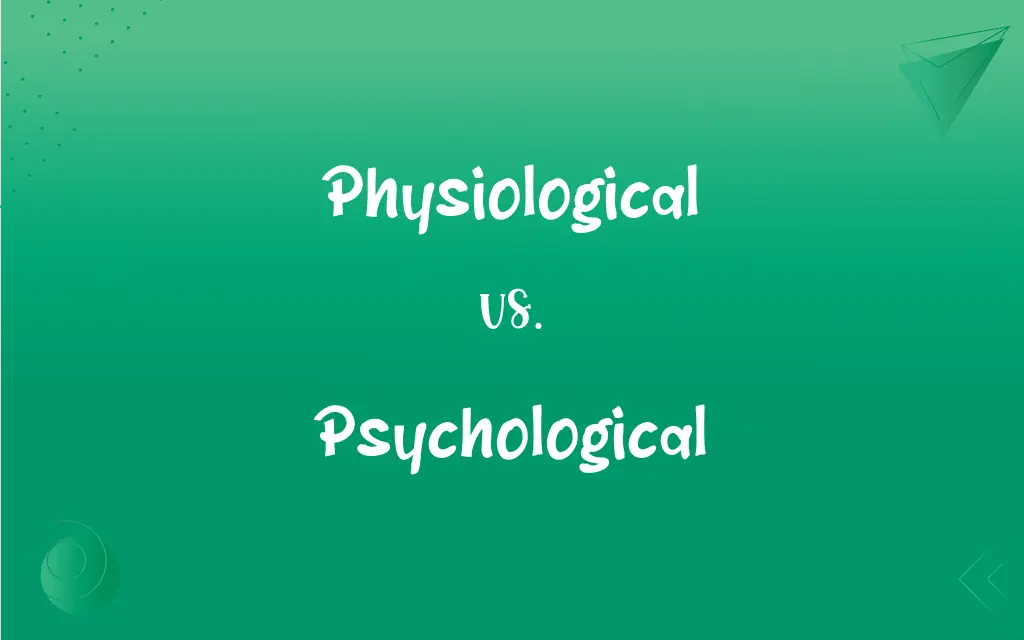Physiological vs. Psychological: What's the Difference?
Edited by Aimie Carlson || By Harlon Moss || Updated on October 7, 2023
Physiological pertains to the body's functions and processes; psychological relates to the mind, emotions, and behavior.

Key Differences
Physiological refers to the physical processes and functions of the body, encompassing how organisms, body systems, organs, cells, and bio-molecules carry out their functions. Psychological, on the other hand, delves into the realm of the mind, exploring thoughts, feelings, behaviors, and the underlying processes.
From a medical perspective, physiological conditions might encompass aspects like heart rate, blood pressure, and respiration. Conversely, psychological conditions can include disorders such as depression, anxiety, or phobias, which are rooted in mental and emotional states.
In research, physiological studies might involve the examination of bodily reactions, for example, the response to a drug or the function of an organ. Psychological research often focuses on behavior, cognition, and emotion, such as studying the effects of stress on memory or understanding behavioral patterns in certain populations.
When addressing health, both physiological and psychological aspects are crucial. A person might have physiological symptoms like fatigue due to anemia, while another might experience fatigue as a psychological symptom of depression.
Educationally, while both fields have distinct study areas, there are intersections. For instance, physiological psychology or biopsychology bridges the gap by studying how the brain and neurotransmitters influence our behaviors, thoughts, and emotions.
ADVERTISEMENT
Comparison Chart
Primary Focus
Body's physical processes and functions.
Mind's thoughts, feelings, behaviors.
Examples
Heart rate, digestion, respiration.
Depression, memory, cognitive patterns.
Study Area
Biology, anatomy, medicine.
Psychiatry, counseling, social sciences.
Issues/Conditions
Diabetes, anemia, high blood pressure.
Anxiety, schizophrenia, behavioral disorders.
Interventions
Medication, surgeries, physical therapies.
Psychotherapy, counseling, behavioral interventions.
ADVERTISEMENT
Physiological and Psychological Definitions
Physiological
Relating to the body's normal functions and processes.
Regular exercise has numerous physiological benefits.
Psychological
Pertaining to the mind or mental processes.
She underwent a psychological evaluation.
Physiological
Pertaining to the mechanisms of the body.
Her research focused on the physiological effects of stress.
Psychological
Involving cognitive and emotional responses.
The film had a deep psychological impact on the audience.
Physiological
Of or relating to the branch of biology that deals with the bodily functions.
His doctor checked for any physiological abnormalities.
Psychological
Of or relating to the study of psychology.
He sought psychological help to address his phobias.
Physiological
Concerning the operations of living organisms.
They studied the physiological responses of plants to light.
Psychological
Concerning emotional and behavioral attributes.
His reaction was more psychological than physical.
Physiological
Involving the science of life and living organisms.
Physiology classes explore the physiological aspects of various species.
Psychological
Relating to the science of behavior and mind.
Psychological studies have provided insights into human behavior.
Physiological
Of or relating to physiology.
Psychological
Of or relating to psychology
Psychological research.
Physiological
Being in accord with or characteristic of the normal functioning of a living organism.
Psychological
Of, relating to, or arising from the mind or emotions.
Psychological
Influencing or intended to influence the mind or emotions
Psychological warfare.
FAQs
What does physiological primarily focus on?
Physiological focuses on the body's physical functions and processes.
How does one's psychological state affect physiological health?
Chronic stress or anxiety, which are psychological, can lead to physiological issues like heart problems.
Can meditation have physiological benefits?
Yes, meditation can bring physiological benefits like lowered blood pressure and reduced stress hormones.
How are physiological and psychological studies interconnected?
Areas like physiological psychology bridge the two by studying how the brain influences behavior and emotions.
Who should one approach for psychological issues?
Psychologists, psychiatrists, counselors, or therapists.
Why is it essential to understand the difference between the two?
Because it helps in accurate diagnosis, treatment, and understanding of human health and behavior.
What is the main area of interest for psychological?
Psychological pertains to the mind, encompassing thoughts, feelings, and behaviors.
Are psychological treatments limited to talk therapy?
No, psychological treatments also include behavioral interventions, medication, and more.
Can a person have both physiological and psychological issues?
Yes, for example, a chronic illness (physiological) can lead to depression (psychological).
Which professionals deal with physiological concerns?
Medical doctors, physiologists, and other healthcare professionals.
What's a common physiological response to fear?
Increased adrenaline and a faster heart rate.
Can psychological therapies help with physiological disorders?
Yes, for instance, cognitive-behavioral therapy can help manage pain in some patients.
Can physiological conditions impact psychological well-being?
Yes, chronic physiological conditions can influence mood and mental health.
Can psychological issues manifest as physiological symptoms?
Yes, for example, stress (a psychological issue) can lead to headaches or stomach issues (physiological symptoms).
How do doctors treat physiological issues?
They may use interventions like medications, surgeries, or physical therapies.
Is a heart rate increase physiological or psychological?
It's physiological but can be triggered by psychological factors like stress.
How are physiological processes measured?
Through methods like blood tests, MRIs, or heart rate monitoring.
Are dreams physiological or psychological?
Dreams are primarily understood as a psychological phenomenon, though they occur during the physiological process of sleep.
Is learning a physiological or psychological process?
Learning involves both; while it's a psychological process, it's based on physiological changes in the brain.
Do physiological and psychological fields ever overlap in studies?
Yes, areas like neuropsychology or biopsychology are intersections of both.
About Author
Written by
Harlon MossHarlon is a seasoned quality moderator and accomplished content writer for Difference Wiki. An alumnus of the prestigious University of California, he earned his degree in Computer Science. Leveraging his academic background, Harlon brings a meticulous and informed perspective to his work, ensuring content accuracy and excellence.
Edited by
Aimie CarlsonAimie Carlson, holding a master's degree in English literature, is a fervent English language enthusiast. She lends her writing talents to Difference Wiki, a prominent website that specializes in comparisons, offering readers insightful analyses that both captivate and inform.







































































